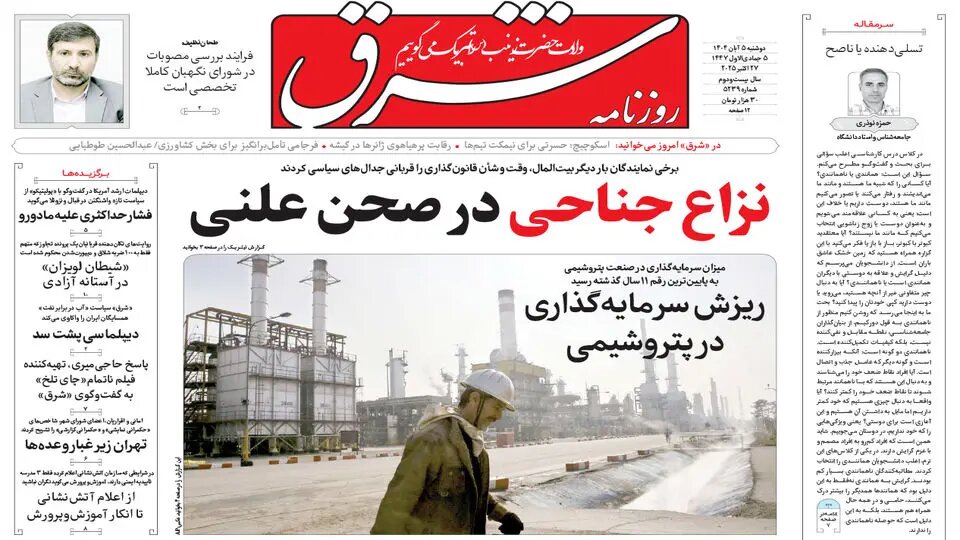Iran: A link of the new East and a test of global resolve

TEHRAN - In a recent analysis, Shargh underscores the strategic significance of Iran’s position within emerging global blocs, namely BRICS and the Shanghai Cooperation Organization.
The piece argues that renewed sanctions against Tehran pose not only a challenge to Iran itself, but also a test for the credibility and autonomy of these non-Western alliances. If BRICS and the SCO remain passive in the face of such pressures, their claims to political and economic independence from Western dominance risk being undermined. Conversely, a proactive and supportive stance could mark the dawn of a genuinely multipolar international order. Iran’s role in this evolving landscape is pivotal. Geopolitically situated at the crossroads of East and West, endowed with vast energy reserves, and bearing deep cultural and civilizational influence, Tehran is positioned as an unavoidable waypoint in the trajectory of any new global configuration. Whether by choice or necessity, the path to a rebalanced world order will pass through Iran. Support or lack thereof for Iran will serve as a benchmark for assessing the political maturity and strategic coherence of these institutions. The challenge facing BRICS and the SCO today transcends Iran; it is a test of their collective vision for the future of global governance. A coalition of independent powers is striving to forge a new equilibrium grounded in mutual respect and shared interests.
Jam-e-Jam: FATF black response
Jam-e-Jam has examined the Financial Action Task Force’s (FATF) decision to maintain Iran on its blacklist, even though Tehran has ratified the full set of requirements for membership. The newspaper says this move underscores the political and ideological challenges posed by an institution heavily influenced by U.S. interests. The paper argues that FATF’s decision is not technical, but a calculated signal from Western-affiliated bodies to domestic political factions. It highlights how the nature of financial transactions between the United States, three European countries, and Iran further reveals the need for strategic recalibration. The behavior of the FATF and the type of transactions between the U.S. and three European countries with Iran show that the authorities in Tehran should have serious plans to diversify trade partners (such as China and Russia) and develop national cryptocurrencies, and use national currencies in trade transactions. Iran can turn this challenge into a platform to advance its goals by relying on its domestic capacities and regional alliances. It should give up hope in Western-led institutions. A multipolar world is taking shape, and Iran's role in it will increase if the authorities believe in it and plan for it.
Sobh-e-No: The end of Western decision-making monopoly
In an article, Sobh-e-No examined the political deadlock facing Western powers following the reactivation of the snapback mechanism against Iran. The paper argues that this move highlights three key developments that have disrupted the coherence of the West’s sanctions regime. First, the JCPOA has effectively collapsed. Applying the snapback mechanism to an agreement that no longer exists lacks legal standing under international law and remains largely symbolic. Second, the expiration of UN Security Council Resolution 2231 has removed the legal foundation that once supported the JCPOA. Without this resolution, there is no longer a valid framework within the Security Council to justify such measures. Third, the snapback mechanism has lost operational viability due to the absence of an international consensus. The refusal of Russia and China to endorse the snapback initiative has rendered it ineffective. The West’s renewed emphasis on dialogue with Iran stems from a growing recognition that Tehran’s involvement is indispensable to any regional or nuclear equilibrium. In the end, the snapback does not restore Western authority; rather, it symbolizes the decline of unilateral decision-making and the emergence of a more pluralistic global order.
Iran: Reframing the nuclear file beyond JCPOA
In a recent article, the Iran newspaper explores the evolving trajectory of Iran’s nuclear dossier following the formal end of the JCPOA. The editorial highlights a strategic shift led by Tehran, Moscow, and Beijing to move the issue from the political arena of the UN Security Council to the technical domain of Vienna. The three countries advocate for a framework in which Iran’s nuclear activities are assessed solely through the lens of the International Atomic Energy Agency’s safeguards obligations. Russian officials have reinforced this position, stating that with the expiration of Resolution 2231, the IAEA is no longer required to submit special reports on Iran to the Security Council. From this point forward, monitoring of Iran’s nuclear program should proceed exclusively under the Comprehensive Safeguards Agreement, the foundational structure of the IAEA’s work. This approach eliminates the need for politically motivated reporting and restores the technical neutrality of the process. Therefore, by removing the JCPOA label from the Iranian nuclear file, this issue will return to its natural course and distance itself from sectional interpretations and political pressures from Western powers.
Leave a Comment